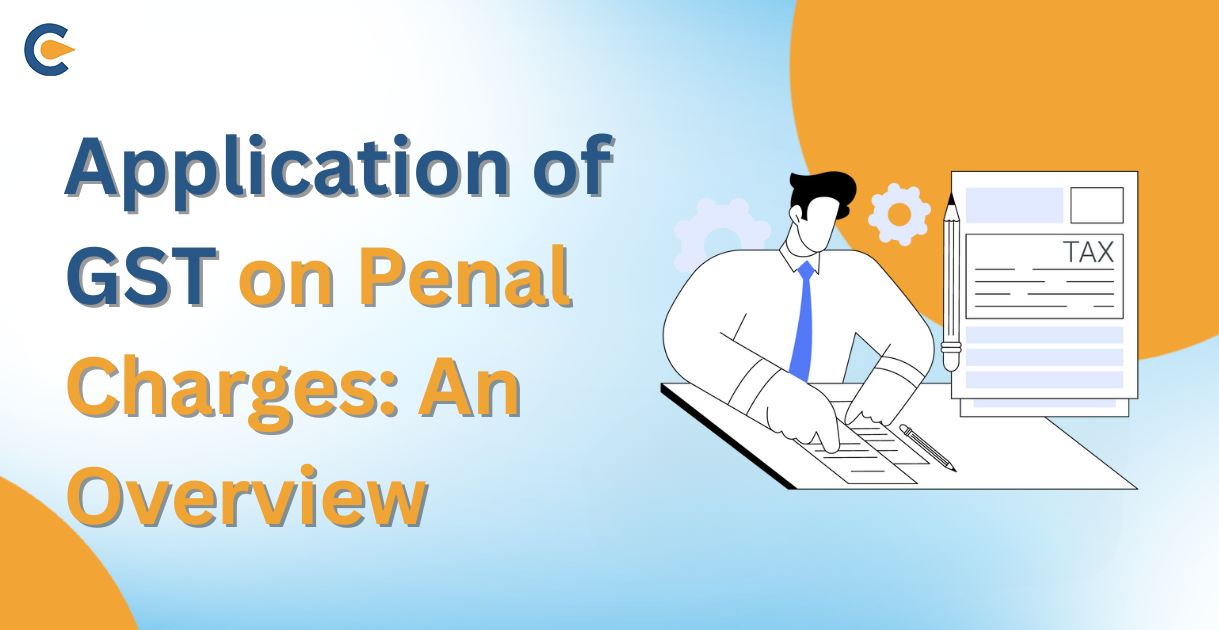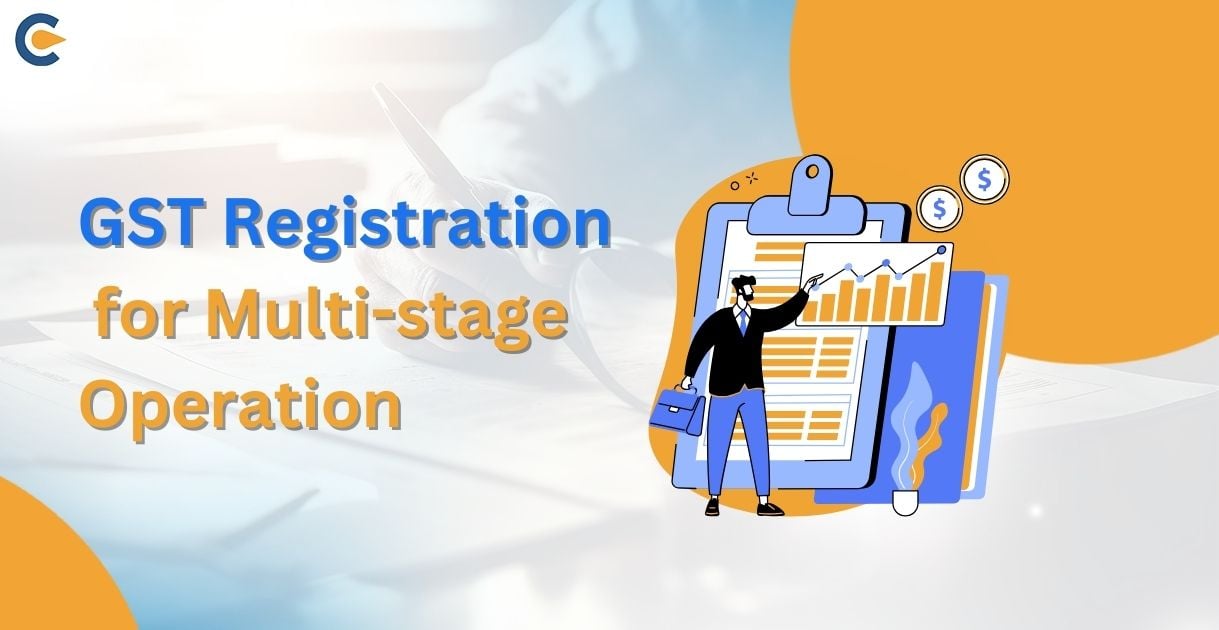GST on Penal Charges: Many indirect taxes imposed by the federal and state governments have been replaced with the single Goods and Services Tax (GST). The ability to impose and collect taxes on goods and services is shared by the federal and state governments under the GST. The GST, or goods and services tax, is considered to be one of the most significant tax changes since independence. The groundbreaking GST indirect tax reform will eliminate interstate trade obstacles and establish a single national market. Numerous indirect taxes levied by the federal and state governments have been absorbed or included by the GST.
Benefits of GST Registration
GST registration has numerous benefits in India. These benefits of GST registration attract the taxpayers in the country to comply with GST. Some of the advantages of registering GST are:
- The removal of numerous levies from the Indian tax system was one of the main objectives of the GST implementation.
- There were various indirect taxes in place prior to the 2017 implementation of the GST laws. Of course, each of these taxes had a different set of compliance requirements, which further complicated matters. There has only been a single, consolidated return that taxpayers must file since the new tax system went into effect.
- After the GST was put into place, India became a single market and saw a sharp increase in foreign investment.
- The GST site is available to everybody at any time, sitting anywhere. This makes filing returns easier. This is quite advantageous for all kinds of enterprises.
- There would be minimum tax cascading if there was a system of smooth tax credits that extended across state lines and the value chain.
- The tax administration is now operating in an anti-corruption manner. Allowing the applicable tax to be disclosed on sales invoices has also contributed to transparency.
GST on Penal Charges
According to the 2019 GST Circular, the term “interest” would include punitive interest in the event of a money-to-money transaction. It is unclear if the aforementioned position still makes sense in light of the RBI Guidelines. The RBI has stipulated that the penalty imposed by lenders is neither extra interest nor further interest in accordance with the guidelines on punitive charges. Penalties are assessed in addition to interest, and the RBI explicitly states that they are not to be construed as interest, even in cases where the penalty is determined by the length of time the default persists. When it comes to penalties, the loan agreement is the point of origin of the penalties.
Money that is loaned is the main source of supply. It is unlikely to argue that a loan by nature is not a form of supply; however, interest on a loan is exempt in this situation. This financial obligation is associated with the penalties for late payments. Nobody can argue that a lender would’ve regarded a penalty to be a separate source of income; in fact, the RBI Circular of August 18th is based precisely on that assumption of GST on penal charges. The penalty discourages the borrower from creating that loss since late payments result in a loss of time value for the loan.
One could contend that this is a deterrent punitive action. It appears that the penalty will continue to be free from GST on penal charges since it is either linked to the principal supply, which is the loan of money on interest, or it is interpreted as an act of intolerance for non-compliant behaviour.
Given that penalties are not considered “interest” by regulations, is it possible to claim that they are exempt from the GST on penal charges – the exemption that applies to “interest”? To dispel any ambiguity over the applicability of GST on penal charges, the Ministry of Finance released a circular on August 3, 2022, outlining the official stance on GST on penal charges.
How to Imply GST on Penal Charges
The implication of GST on penal charges is also very important. As a result, there are several GST on penal charges consequences that are addressed using examples. We can understand the concept of GST on penal charges with different examples.
- Situation 1:
Mr. A (the borrower) purchases an automobile from ABC Co (the lender/shopkeeper), who sold it to him for $6,000,000. However, the car’s selling price can be paid by Mr. A over 24 months (24 installments) for a total of 26,250 (principal repayment of $25,000 plus interest of 5 percent, or $1250). Every tenth of the month, the installment is due; failure to do so will result in a penalty interest charge of 500 rupees each day.
Here, rather than being a money-to-money exchange, the transaction between Mr. A and ABC Co. is one of the provisions of taxable products. The store owner has divided the payment into installments, known as the EMI service. The interest component of the aforementioned EMI is additionally subject to GST. Additionally, a penalty interest is added to the late payment. As a result, the interest and fines paid on the late payments must be included in the value of the supply, bringing them inside the GST’s purview.
Additionally, Article 5(e) of Schedule II of the CGST Act will not apply in this circumstance. When the offending party faces penalties for late or non-payment, the phrase “tolerate an act” cannot be stated to apply in that case.
The aforementioned is not exempt and is subject to GST because it is not covered by serial no. 27 of the notification.
- Situation 2:
ABC Co. offers Mr. A an automobile for $6,000, which is the selling price of the vehicle. Mr. A has the option to purchase the car from XYZ Co. using a car loan with an interest rate of 12 percent annually. The loan from XYZ Co. stipulates that A has 24 months to pay it back, along with an additional penalty interest of 1 percent per year for each day the loan is late.
In the present instance, XYZ Co. and Mr. A. engaged in a money-to-money transaction. According to serial number 27 of notification number 12/2017 Central Tax (Rate) dated June 28, 2017, “services by way of (a) extending deposits, loans, or advances in so far as the consideration is represented by way of interest or discount (other than interest involved in credit card services are exempt”.
As a result, in this instance, the “penal interest” assessed on the transaction between XYZ Co. and Mr. A would not be taxable under the GST law. For GST purposes, the value of the supply made by ABC Co to Mr. A would be $6,000,000. The interest and additional/penal interest levied by XYZ Co (lender) will not be subject to GST because they are exempt supplies.
As a result, the vendor has the following choices for the buyer when selling the vehicle:
- Provide a deferred payment facility by the vendor himself on account of the purchase of the car, or
- Provide a loan facility to purchase the asset through the vendor’s captive lending unit, or
- Provide a loan facility to purchase the asset through any bank/NBFC.
GST taxability will vary in each of the three situations mentioned above. If the vendor offers a deferred payment option and the borrower delays making their EMI payment, GST will be applied to the extra interest that results from the delay. However, the additional interest levied on the postponed repayment would not be subject to GST if a loan facility has been provided by the vendor’s captive lending arm, an independent bank, or an NBFC.
Conclusion
In conclusion, it is very important to stay in compliance with the GST rules and regulation in the country. With this blog we have comprehended the GST on penal charges. The non-compliance results into fines, penalties and even imprisonment in serious cases. It also vital to comprehend the GST laws in order to stay in compliance.
Corpbiz assists all types of businesses in their GST registration and various other GST-related compliance services. Our experts have deep knowledge in GST and its rules and regulation.
Frequently Asked Questions
Is GST chargeable on penalty?
It has been made clear that the value of the products and services would include interest and punitive interest levied in connection with their delivery and that these amounts will be subject to GST.
What is the percentage of penalty in GST?
Since the underpaid tax amount exceeds Rs. 10,000, the GST penalty is 10% of the unpaid tax amount; nevertheless, big-value frauds are also punishable by jail time.
Is GST applicable on charges?
The total value of the supply must be subject to GST. GST on freight costs must be applied at the same tax rate as the tax applied on the supply of the goods or consignment if the freight charge is included.
Is GST on penal charges applicable?
As the interest is regarded as an exempt supply, there won't be any GST applied to the interest or additional/penal interest levied by XYZ Co. (the lender). Consequently, under the 2019 GST Circular, criminal interest will fall under the definition of “interest” in the event of a money-to-money transaction.
What is a GST Registration?
Obtaining a distinct, 15-digit Goods and Service Tax Identification Number (GSTIN) provided by the GST authorities is a prerequisite for GST registration with the tax authorities. This number allows all company activities and associated data to be gathered and connected.
In accordance with the GST Act, when must I register?
30 days from the date on which your responsibility first materialized. For a non-resident taxable person or casual taxpayer, five days before the business opens for business
What does “supply value” mean in GST?
The cost or consideration that the provider receives from the consumer in a transaction is the value of the supply. GST is not included, however additional costs like shipping & handling are. Even if they aren't sales, some transactions—like transferring stocks between two states—are nonetheless regarded as taxable.
What is the CGST Section 15?
Provisions pertaining to the value of supplies of goods or services rendered in various situations and to various individuals are contained in Section 15 of the CGST.
Is penal interest included in the second schedule of CGST Act?
No, the penal interest is not included in the second schedule of the CGST Act.
Is GST applicable on additional/penal interest on delayed EMIs?
When the EMIs are overdue, the penal interest on them is taxable in nature under GST. It will be treated as the supply's value.
Read Our Article: How To Use Input Tax Credit For The Payment Of GST Demand?













